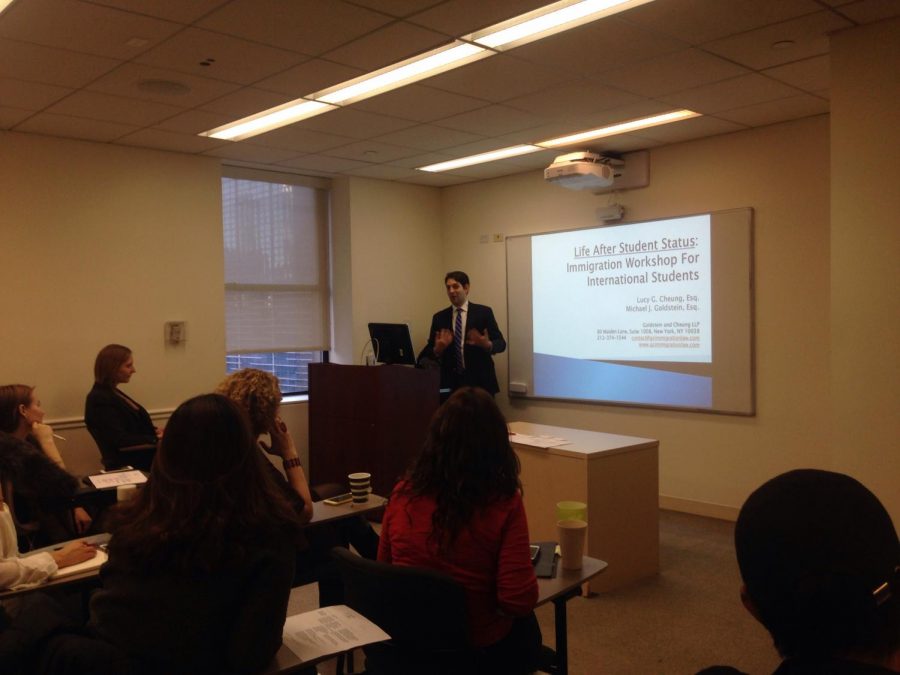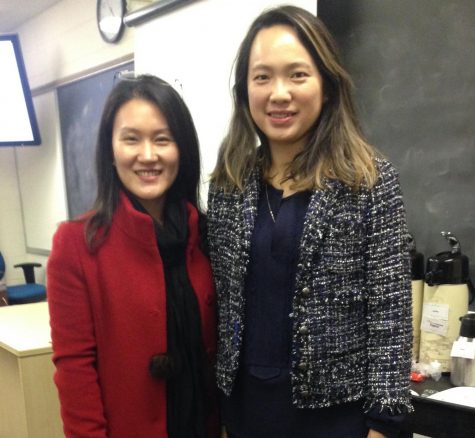Attorney Speaks to International Students About Their Life After Graduation (Long Version)
International students were given the opportunity to speak to an attorney about their future and their options once they graduate from college.
International students were given the opportunity to speak to an attorney about their future and their options once they graduate from college.
Michael J. Goldstein spoke to students on November 29th about forms, employments, green cards and visas. Following his father’s footsteps, Goldstein became an immigration lawyer and has been for seven years. He works in Goldstein and Chung LLP and has helped many international students as well as immigrants find ways to stay in America whether it be by sponsorship or getting their green cards.
In order for international student to study in America, they must complete the I-20 form which is provided by the school. Once they have the I-20 form completed, they can apply for a F-1 visa in order to come to America and have a student status. It gives them a chance to work in the United States, whether it be on campus or outside of the campus.
They also have to complete their SEVIS paper which stands for Student Exchange Visitors Information System. It allows schools or other sponsoring organization to transmit the student’s database to the INS which is the U.S Immigration and Naturalization Service. It is a way for INS to know about any changes or action taken in the student’s academic career.
“The process was very smooth. It took a while to get the papers and the visa with the I-20 but the process was not complicated or difficult in any way.” says Katharina Oberdiek who has been studying at Mercy College for three months and is starting her winter quarter.
Oberdiek is currently an MBA student majoring in Finance from Germany. She heard about the college through EF Language Centers located in Tarrytown. She is living in Bedford-Stuyvesant, Brooklyn and sharing an apartment with four other people. Oberdiek decided to come to America because she wanted to get her MBA abroad and she heard many great things about American schools.
“American universities are spoken highly of and I really wanted to get a great education. Another reason is the workload. I like being busy.” says Oberdiek.
A student is eligible for F-1 visa status if they are funded by an outside or personal source or both. F-1 students are eligible for an OPT which is an off-site program that students can participate and learn about their field of study. It also gives the students a chance to work for one year per education level on a student visa. A benefit from OPT is that students don’t need an employer prior to applying. F-1 is issued for an international student who is attending full time at a U.S college or university. They can only stay in the country if they are enrolled in a school, once they are done with school they have 60 days to leave the country. That is if they find someone to sponsor them, then they can stay longer.
Cuong Nguyen is a graduate student from Vietnam majoring in Management. He was told about Mercy College through a friend that lives in New York and has been studying here for two years. Nguyen is getting his masters degree in Business Administration at Mercy, he got his bachelor’s and finished his undergraduate in Switzerland.
Before Nguyen applied to Mercy, he came to America with a G-1 visa in order to work here for a year. He went to South Carolina to do an internship but once the training program was completed and the visa was expired, he was expected to go back to Vietnam. Nguyen didn’t want to go back and decided he wanted to study in America so he applied for an MBA in Mercy and got it. In order to go to school in America, he changed his visa to an F-1 which is a student visa.
Nguyen will be finished with school in May which still gives him five months to look for a job or company that can sponsor him. He will begin to look for it in February but in order to stay in this country he will need to start looking for it fast, if by the end of May he doesn’t have a sponsor, he will have to go back to Vietnam.
“I have to go back to my country if I don’t get an employer or a company to sponsor me. I need to apply to OPT in February, OPT only gives me an year to stay here after that one year hopefully I can get sponsorship.” shares Nguyen.
Just like Nguyen, Oberdiek has not yet found an employer or company to sponsor her, being that it is difficult to find someone that would want to sponsor them. Companies and employers have to pay around $5,000 to sponsor an international student, an amount that not many want to pay. An employer must have a reasonable amount of money to pay for the H1B employee salary.
“I haven’t gotten an employer to sponsor me yet but I keep looking for job opportunities and potential sponsorship for the future.” says Oberdiek.
Employers and companies do sometimes discriminate against those that aren’t from America or don’t look like they are. Nguyen was discriminated when he was an intern in a company in South Carolina.
“There were a lot of white people in my internship who talked behind my back and verbally bullied me. I reported it to the manager but they didn’t care. I think it could have been that I was an intern, or maybe that I was Vietnamese.” shares Nguyen.
Goldstein warns students that sometimes they will face employers that can discriminate and may not want to work with international students because of the amount they must pay to sponsor them.
“Employers can discriminate, they don’t really want international students because they have to pay for them. You do need to tell them that you have to be sponsored and they might say no and that’s okay. Just find one that is willing to sponsor you.” Goldstein says.
It is also tough on employers to sponsor international students not only because they have to pay but because they also have to confirm that they couldn’t find an American citizen to do the job so instead they hired an international student. Employers also have to fill out many forms in order for an international student to work with them. Employers must fill the Labor Condition Application on behalf of the employee that is applying for a work authorization.
The employers must also file an H1B visa on employee’s behalf. An individual cannot sponsor themselves or apply for H1B, they are required to find someone to do it for them. For an H1B visa, the major degree must match job duties and the student must have a bachelor’s degree. During their wait, students can get their Cap Gap which allows certain students waiting for H1B to be approved to have an extension and remain in the U.S as an F-1 statues until their start date of approval but it’s only for spring graduates. The H1B might not be approved which is also a problem.
“If your petition of H1-B is not accepted then it goes back to the employer. If you get an employer who wants money for filling fee, don’t let them take it out of your payroll.” says Goldstein.
Once the employer offers the student the job and applies for their H1B, the student can work for up to six year in the U.S with H1B visa. After those six years, the student can either go back to their country or apply for a green card. Also, if the employer doesn’t renew H1B, then the student is forced to go back to their country. If the employers decides that they want to keep the student, the student can stay for up to 3 years.
Those who want a green card have several options, one being sponsored by an employer. Once the students is changed from F1 visa to H1B, they can get a green card. Getting a job sponsorship is the most difficult because of all the forms the employer must complete, the amount they have to pay and the difficulty it is to verify that no American citizen was capable of doing the job. If the student can get multiple sponsors, they can stay longer but it would be more expensive.
“ It’s going to be expensive to have multiple sponsors. You can change an employer but only after approval. You can’t do self- employment anymore and be careful if your employer doesn’t give you a payroll” warns Goldstein.
The other ways they could stay is if they married someone who is a U.S citizen which is the easiest way to obtain a green card. The spouse will sponsor them but both must have consent and knowledge of the situation. As the person applies for a green card, both must show that they are in a real marriage and have to prove it to the government. Another way is if the person can prove that their country is at risk and their life is at risk in their home country, then they are eligible for a political asylum. It is advised to speak with an immigration lawyer before applying for an asylum.
Another way is to enroll in the U.S military. Although there is a rule that you can’t join unless you have a green card, you are still eligible to join even you don’t have a green card but only if the can confirm that they were an international student for two years. Last option is a green card lottery which is held every year. The application period is between October and November. Countries that a lot of immigrants have came in the U.S are not eligible to apply so the chances of them getting it are very slim.
“ You have to be here in the U.S in order to get your green card, you are not allowed to travel. Renew your visa while you wait for green card, you may have 1-40 but you need to wait years to get the green card.” says Goldstein.
Nguyen is hoping to find someone to sponsor him before time’s up, he is planning on staying in America after he gets his masters. He doesn’t want to apply to get a green card because it’s too expensive. To apply and get a green card can be up to a million dollars, an amount that these student don’t have and can’t afford.
“ I don’t have the money to invest in a green card. I am going to get an employer to sponsor me and then get an H1B visa. I have a chance in getting H1B as an MBA student. I have a better chance as an undergraduate. That’s the only way I can stay here, I know my chances are small but I still want to try.” says Nguyen.
If Nguyen finds a company or employer to sponsor him then he has six years to stay in America. After those six years are up, he will draw in a lottery to see if he can get a green card. His chances are quite small considering how many people want to get their green cards. But if he does win in the lottery, he doesn’t have to pay the million dollars.
“If they sponsor me, I get five more years to live in America. After 5 years of the employer. I have to do lottery. If I get lottery, I get the green card so I don’t have to pay for it.” says Nguyen.
Students can also get an EB1 visa which is a employment-based permanent residency intended for priority workers that are great in their field. Applicants must demonstrate that they have an extraordinary ability to work in the U.S only in their field of knowledge but it’s very hard to get it because it’s for the best of the best.
Mohammad Yusuf Khokar is from Saudi Arabia, he completed his undergrad in India in 3 years and is now a MBA student in his 2nd quarter majoring in Market Business Administration at Mercy College. He came to America as a tourist in 2016 and fell in love with New York, he knew he wanted to continue his studies in New York so when he went back to his country, he looked online for MBA programs and found Mercy College.
In order to get accepted into Mercy College, he had to take a IELTS exam which is an English exam, a math exam and sent his transcript but he had to do a lot of paperwork to get it through because they couldn’t accept it due to it being from another country. He also needed two letters of recommendation and had his father sponsor him for an employment letter. He did all the paperwork from Saudi Arabia.
Khokar has been here only three months and still is adopting to America and it’s laws. His brother is with him in America right now but he is going back to Saudi Arabia in January. Khokar is living with his father’s friends as he finishes his education in America.
“ When I feel ready, I will apply for OTP for now I am doing my studies. OTP is a one year permit to work for a company. I need two more years with OTP to complete my masters.” says Khokar
Khokar has a problem that he will need to face in a few months, his brother is getting married in Saudi Arabia and Khokar wants to be there for his brother to support him. But the problem is that the wedding will be during the spring semester which will make him miss several days from classes. He will be in Saudi Arabia for two to three weeks. Something that is not a justified reason for missing school days, some classes only allow two absences while others allow four but either way missing out on so many classes can have it’s consequences.
“ I’m going to miss classes which will make me fail. I might need a lawyer in case there is an issue when I come back. I might go to the attorney in the event for help but it cost too much.” says Khokar.
Khokar doesn’t know what the future holds for him and isn’t sure if he wants to stay in America or not. “I haven’t decided anything. I am going to complete school and work here but I’m still not completely sure. My dad will need me in his job for the family business. At this point in time, I might change my mind.” says Khokar.
Goldstein consultations are $250 per hour but with a student discount, students can get $100 off their first visit. He advises students to be careful when consulting a lawyer because no lawyer will do anything for free. Immigration lawyers should cost about $2,000 to $3,000. Plus fees of $3,000. Goldstein does have a few advice for students who are looking for a lawyer.
“ Find an attorney who is valuable but not expensive. Cheapest is not always the best either, you get what you give.” says Goldstein.
He warns students that they should be careful when choosing a lawyer. The lawyer should be a member of AILA which stands for American Immigration Lawyer Association, The lawyer should only practice immigration laws and keep everything confidential. The student should also find a lawyer that someone reliable referenced. Goldstein also told students that the best way to find a lawyer is by googling them, finding who they are and how many cases they won.
“Find out everything you can about them. Immigration attorneys can work in any state so you don’t have to find someone here in New York City.” Goldstein says.
To find someone who is reliable and can advice students with employment and information, Goldstein tells students to talk to a foreign student adviser or Designated School Officials (DSO), an appropriate lawyer or New York City Bar Legal Referral Services which matches you with a lawyer that fits with your needs. Goldstein also told students to beware of mistaken perception of new laws and information from online materials. Social Media can be dangerous if you don’t know the right way of networking. He advises students to network for employers and companies but to do it in the correct and safe way.
“ Network so you know which employers are willing to work with you or not so you don’t waste your time.” advises Goldstein.
The students learned about all the federal agencies that are out there, Department of State being one of them which handle matters of foreign affairs with other nations. United States Citizenship and Immigration Services is also a federal agency that is in charge of granting visas among other immigration benefits. Another federal agency is CBP which stands for Customs and Border protection, they are the ones that stamp the students to come in America. ICE is also another federal agency which stands for U.S Immigration and Customs Enforcement which enforces federal laws. Goldstein warns students to stay away from them, they are basically immigration police.
With immigration and policies being at it’s peak right now, it’s a problem international students are scared of. They are a bit frighten that if they don’t fill out the right forms or do it in the right way, they could face some consequences.
“At the moment it scares me only a little because no one knows what’s gonna happen tomorrow and in what way and to what extent these policies will be further strengthened in the future.” says Oberdiek.
Goldstein briefly talked about immigration policies going on today, he assures students not to worry because not much is changing as of right now, nothing has been passed yet. It takes years for a new immigration law to come out.
“Don’t be scared. The media tries to scare you but advertisers are just trying to pay their bills. Not much is changing on immigration laws, not as of right now.” says Goldstein.
Goldstein reassures students not to worry much on visa because it’s out of the state. They should be more concerned on statues because they are already in the state. He tells students that it is important to start looking for an employer or company to sponsor them because once time runs out and they didn’t find one then they will have to go back to their country.
“ You don’t have enough time to get an employer to sponsor you. Don’t wait the last minute when your forms and visa expires, it doesn’t give us lawyers enough time to gather everything up and help you.” Goldstein explains.
Goldstein also advises the students to see their DSO if they need more time to finish their education. He makes sure they understand that they shouldn’t wait last minute to do this. The DSO can extend a student’s duration in America if they need more time to complete their studies. It’s also important for them to have a work authorization in their I-20 in order to work or else there will be future problems.
The event was informative to the student but some students believed that the attorney could have spoken more about green cards and be more in depth about other ways to become a resident.
“ He provided information about OPT and H1B visa which I know. He focused more on getting a job which is good because I want to get a job and have a company to sponsor me. But most of the information he said was already known to international students like me. I did research before so the presentation didn’t apply to me as much.” says Nguyen.
Khokar just like Nguyen feels that the attorney could have spoken with them a little more on ways to becoming a resident here in America.
“It was helpful. He talked about how to apply for a job, what the forms were and when we should apply. He didn’t focus on other ways of becoming a resistant because I would love to stay here.” shares Khokar.
Oberdiek disagrees. “The event was very helpful! I learned so many things that I did not know before and I left later on with no question unanswered. He covered everything from F-1 over to H1B to Green card with all requirements and procedures.”
“I learned about the application procedures and the different types of visas as well as the different types of Green cards. It helped a lot regarding the various steps for an application and what kind of documents are needed as well as what institutions are involved.” continues Oberdiek.
Although they had mixed thoughts on whether the event was helpful or not, one thing they did agree on is that they found the event necessary for international students in order for them to get some more knowledge on how to get an employer to sponsor them. Events where experts talk to them about the forms that they need, deadlines, sponsorship, statues, and visa is very important.
“I think not every student can afford a lawyer for regular sessions and so it motivates students to attend an event like this one. Not every international student is familiar with all the visas and how to apply. He made us aware of the procedure and the opportunities as well as limitations.” shares Oberdiek.
Oberdiek’s plan is to work in the USA on an OPT after she gets her Masters in Business Administration. She wants to get a sponsorship which would lead into her having her H1B visa.
“ I would like to work here for a company which is doing business with a Chinese corporation in order to combine the skills I learned at Mercy College with my Chinese Language skills. I would like to further apply for an employment-based green card in the future.” says Oberdiek.
Nguyen also feels the same way,he believes it’s important schools teaches international students about their options.
“International students don’t know the process of working in America and we need understanding on how to do that. The law in America is difficult so to have an attorney speak to us was helpful.” says Nguyen.
It becomes harder for an international students to come to a new place, not being aware of what is expected from them, what forms they need in order to stay and the many ways they can get sponsored. Having an attorney who knows the law and has covered many cases where he works with international students come to the school and teach them about the information to the students is quite helpful important to them.
“International students come here for the first time to get an education. They make mistakes and people can treat them differently so they need help on what to do when that happens. They need to be educated on rules and regulations but if they don’t know, how are they going to work in that particular category that they want to focus on.” explains Khokar.
For international students and students who are looking for an immigration lawyer, please contact Goldstein and Cheung LLP at [email protected] or gcimmigrationlaw.com.

The name is Loaiza, Andrea Loaiza. She is currently a junior in Mercy College on her way to getting her bachelors in Media and Journalism. She...





